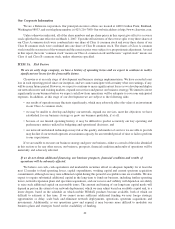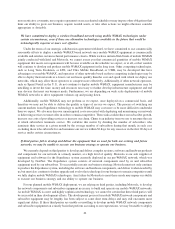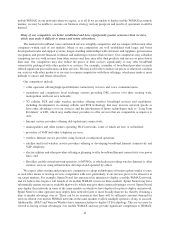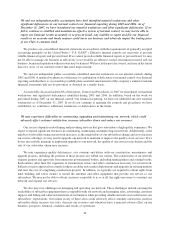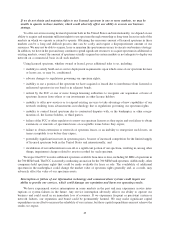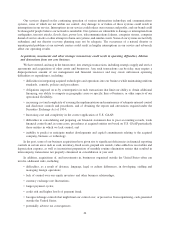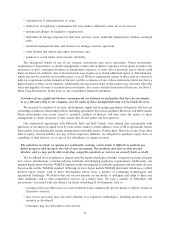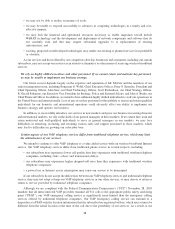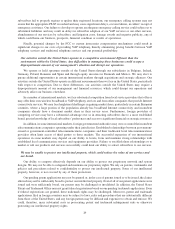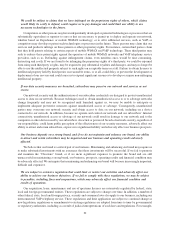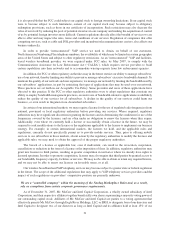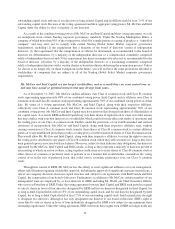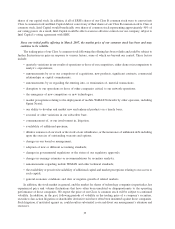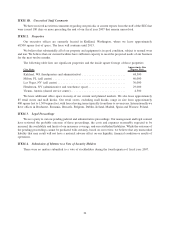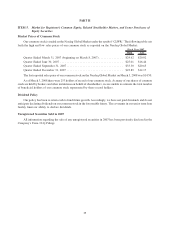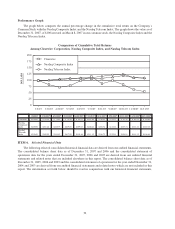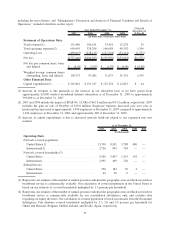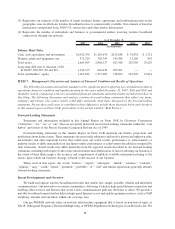Clearwire 2007 Annual Report Download - page 38
Download and view the complete annual report
Please find page 38 of the 2007 Clearwire annual report below. You can navigate through the pages in the report by either clicking on the pages listed below, or by using the keyword search tool below to find specific information within the annual report.We could be subject to claims that we have infringed on the proprietary rights of others, which claims
would likely be costly to defend, could require us to pay damages and could limit our ability to use
necessary technologies in the future.
Competitors or other persons may have independently developed or patented technologies or processes that are
substantially equivalent or superior to ours or that are necessary to permit us to deploy and operate our network,
whether based on Expedience or mobile WiMAX technology, or to offer additional services, such as VoIP, or
competitors may develop or patent such technologies or processes in the future. These persons may claim that our
services and products infringe on these patents or other proprietary rights. For instance, certain third parties claim
that they hold patents relating to certain aspects of mobile WiMAX and VoIP technology. These third parties may
seek to enforce these patent rights against the operators of mobile WiMAX networks and VoIP telephony service
providers, such as us. Defending against infringement claims, even meritless ones, would be time consuming,
distracting and costly. If we are found to be infringing the proprietary rights of a third party, we could be enjoined
from using such third party’s rights, may be required to pay substantial royalties and damages, and may no longer be
able to use the intellectual property subject to such rights on acceptable terms or at all. Failure to obtain licenses to
intellectual property held by third parties on reasonable terms, or at all, could delay or prevent the development or
deployment of our services and could cause us to expend significant resources to develop or acquire non-infringing
intellectual property.
If our data security measures are breached, subscribers may perceive our network and services as not
secure.
Our network security and the authentication of our subscriber credentials are designed to protect unauthorized
access to data on our network. Because techniques used to obtain unauthorized access to or to sabotage networks
change frequently and may not be recognized until launched against us, we may be unable to anticipate or
implement adequate preventive measures against unauthorized access or sabotage. Consequently, unauthorized
parties may overcome our network security and obtain access to data on our network, including on a device
connected to our network. In addition, because we operate and control our network and our subscribers’ Internet
connectivity, unauthorized access or sabotage of our network could result in damage to our network and to the
computers or other devices used by our subscribers. An actual or perceived breach of network security, regardless of
our responsibility, could harm public perception of the effectiveness of our security measures, adversely affect our
ability to attract and retain subscribers, expose us to significant liability and adversely affect our business prospects.
Our business depends on a strong brand, and if we do not maintain and enhance our brand, our ability
to attract and retain subscribers may be impaired and our business and operating results adversely
affected.
We believe that our brand is a critical part of our business. Maintaining and enhancing our brand may require us
to make substantial investments with no assurance that these investments will be successful. If we fail to promote
and maintain the “Clearwire” brand, or if we incur significant expenses to promote the brand and are still
unsuccessful in maintaining a strong brand, our business, prospects, operating results and financial condition may
be adversely affected. We anticipate that maintaining and enhancing our brand will become increasingly important,
difficult and expensive.
We are subject to extensive regulation that could limit or restrict our activities and adversely affect our
ability to achieve our business objectives. If we fail to comply with these regulations, we may be subject
to penalties, including fines and suspensions, which may adversely affect our financial condition and
results of operations.
Our acquisition, lease, maintenance and use of spectrum licenses are extensively regulated by federal, state,
local and foreign governmental entities. These regulations are subject to change over time. In addition, a number of
other federal, state, local and foreign privacy, security and consumer laws also apply to our business, including our
interconnected VoIP telephony service. These regulations and their application are subject to continual change as
new legislation, regulations or amendments to existing regulations are adopted from time to time by governmental
or regulatory authorities, including as a result of judicial interpretations of such laws and regulations. For example,
30


